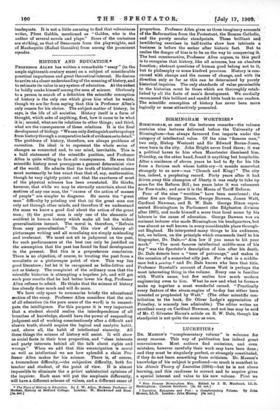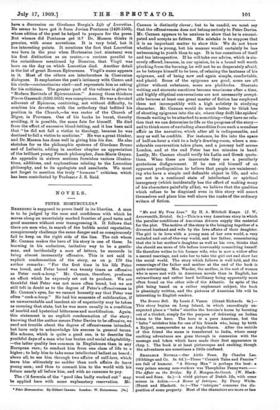LT3CRETIUS.t
DR. MASSON'S "complementary volume" is welcome for many reasons.. This way of publication has indeed great conveniences. Most authors find omissions, and even mistakes, however carefully their work may have been done ; and they must be singularly perfect, or strangely constituted, if they do not learn something from criticism. Dr. Masson's knowledge of his subject is-profound—so much is manifest in his Atomic Theory of Lucretius (1884)—but he is not above learning, and this readiness to correct and to acquire gives a special interest and value to his new volume. First we * Nina Famous Birmingham Hen. Edited by J. H. xi:dolma, LL.D. Birmingham : Cornish Brothers. [2s. 6d. net.]
t Lucretius. Epicurean and Pod a Compiementary Volume. By John Hasson, LL.D. London: John Murray. [Ss. net.]
have a discussion on Girolamo Borgia's Life of Lucretius. He seems to have got it from Jovian Pontanus (1426-1503), whose edition of the poet he helped to prepare for the press. But whence did Pontanus get it ? Dr. Masson thinks it genuine, with some accretions. It is very brief, but it has interesting points. It mentions the fact that Lucretius was born in the year when Hortensius (act. nineteen) won his first distinction as an orator,—a curious parallel to the coincidence mentioned by Donatus, that Virgil was born on the day on which Lucretius died. Another detail is the list of great Roman Epicureans. Virgil's name appears in it. Most of the others are interlocutors in Ciceronian dialogues. It emphasises the poet's intimacy with Cicero and his circle—coniunctissime visit—and represents him as asking for his criticism. The greater part of the volume is given to "Modern Revivals of Epicureanism." Among these thinkers Pierre Gassendi (1592-1655) was conspicuous. He was a devoted adherent of Epicurus, contriving, not without difficulty, to combine his devotion with the orthodoxy that befitted his position in the Church,—he was rector of the Church of Digne, in Provence. One of his books be burnt, thereby avoiding, it is possible, the same fate for himself. He died from the effect of excessive blood-letting, and it has been said that "be did not fall a victim to theology, because he was destined to fall a victim to medicine." He was a great thinker, and Dr. Masson has done well in giving him his due. He also sketches for us the philosophic systems of Giordano Bruno and of Leibnitz, adding in another chapter an appreciation of the brilliant young French philosopher, Jean-Marie Guyau. An appendix in sixteen sections furnishes various illustra- tions, additions, and explanations relating to the Lucretian philosophy, and to its apologists and assailants. We must not forget to mention the truly " humane" criticism which has been contributed by Professor J. S. Reid.









































 Previous page
Previous page